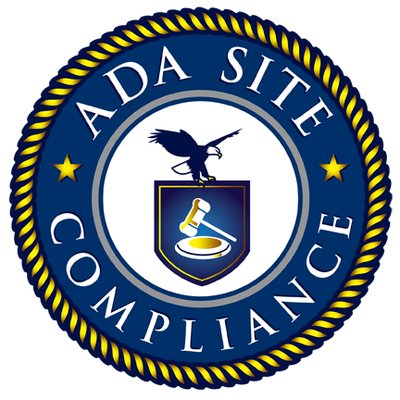Web Content Accessibility Guidelines (WCAG)
 ADA Site Compliance
ADA Site Compliance
Top 10 Benefits Of Website Accessibility
The internet offers massive opportunities and knowledge, so you should design websites that everyone can access. So it is not surprising to see increased emphasis on website accessibility benefits.
What exactly is web accessibility?
This may be next on your mind. Web accessibility ensures your website provides equal opportunity for ordinary people and those with physical impairments like blindness and cognitive disabilities. With one out of four adult Americans having a disability, a website with an accessible design lets everyone, with or without disabilities, experience and enjoy web-based services, content, and digital products.
For example, thanks to web accessibility, people with visual impairments can use multiple assistive technology tools like screen radars to interact with web design and apps appropriately. In addition, accessibility techniques also offer other benefits associated with general readability, findability, and comprehension. And most importantly, it provides the following ten web accessibility benefits to your business.
Top 10 Benefits of Website Accessibility
Most businesses hesitate to make their website accessible because they worry about the associated investments and high costs. To make things worse, most are not even aware of the many benefits of web accessibility. They assume that after spending so much time and effort conforming to site accessibility guidelines, only the users benefit from it, not their business. However, little do they know that accessible websites offer the following ten benefits to business owners too:
1. Increased website traffic
Businesses need to realize that an accessible website will provide equal access to those with physical deformities, cognitive impairments, and ordinary people. So by letting everyone visit and use their site, their traffic rates naturally increase with time. With this increased traffic comes better user engagement and improved search engine optimization rankings, thus leading to possible higher conversion rates.
2. Reduced risk of legal complications
With the high and more challenging legal requirements regarding web accessibility, optimizing your site for people with disabilities makes good business sense. Ensuring your site meets your industry’s specific accessibility standards reduces the risks of facing legal complications and possible prosecution. You don’t provide a reason for anyone to place a case against you for not providing them access to your web content.
3. More customers
Accessible websites ensure you reach more social groups, growing your customer base in the long term. Especially with inaccessible websites missing out on 15-20% of potential clients, an accessible site broadens your market penetration. This, in turn, leads to more customers, improved revenue sales, and enhanced web brand visibility.
4. Helps develop an innovative business mindset
As you optimize your web design for accessibility, you must stay creative and innovative to keep up and adapt your web design to ensure it conforms to the constantly changing trends. This, in turn, proves beneficial to your business as you have to keep yourself updated with the latest trends.
5. Improved website SEO
Everyone knows how getting a high SERP ranking helps improve your website’s online visibility. And with SEO goals and web accessibility methods being pretty much aligned, your accessible web design kills two birds with one stone.
For example, adhering to web content accessibility guidelines (WCAG), like adding ALT-text to images, writing explicit content, and having a clutter-free page, improves your website SEO. Besides, an accessible site boosts your rankings while increasing your bounce rate as your website appeals to screen readers and search engines.
Besides, a site providing easy navigation is user-friendly and helps search engine web crawlers recognize your site. It, in turn, leads to increased higher rankings in relevant search results. Some other good SEO practices worth making include:
No longer making use of images to present text content
Having transcripts for all videos
Using descriptive text alternatives for content in images, links, buttons, and other non-text elements
6. Improves your brand reputation
Another benefit of an accessible website is that it helps build your brand’s reputation. And if you wonder why and how, it is mainly because having a website that everyone cannot access is equivalent to telling your visitors to stay away. These sites do not provide equal opportunity and access to everyone to your business content and features. So those with physical deformities and cognitive issues cannot check out your business.
On the contrary, an ADA-compliant site keeps its doors open for millions of customers who may previously not have been able to access the business. And as only a few websites are ADA-compliant, you prove you care for about 61 million Americans who once could not learn more about you and your business by welcoming them to your website. This boosts and strengthens your brand reputation as people with disabilities with positive web experiences
7. Reduced page loading times
No one has the patience to wait for a page to load. So there is a high chance of your visitors leaving your site if your pages take a long time to load. Thus, you must improve page loading times to provide guests with a fast web experience. And one of the best ways to improve your page speed score is by using a few strategies that help improve your page’s accessibility levels.
8. Helps you reach a broader audience
It is simply good business sense to have a site everyone can access. You not only get more traffic, but they are also from a wider audience. And the good news is that a few logical modifications go a long way in improving the web experience for people with disabilities like visual impairment. It includes making changes like adding transcripts, providing support for mobile devices, and having closed captions to conform to their needs.
9. Better user journey leading to more conversions
An accessible website streamlines your visitors’ journey by guiding them to find what they are looking for while maintaining an optimal user experience. You can do it through the following:
A clear and logical information architecture structure. It makes it easier for visitors to use devices like screen readers, keyboard navigation, and other similar assistive technologies to navigate your site.
Intuitive navigation using wayfinding clues like breadcrumbs make an effective way to help them find what they are looking for or what you want them to see.
Using less complicated forms with descriptive labels in plain English makes filling forms easier and thus increases the number of conversions.
Reducing the number of steps in the checkout process
Providing clear instructions, links, and link text for each step
Ensuring any session timeout is long enough for people with disabilities using assistive technologies to complete.
10. Promotes business growth
Your website represents your business on the internet. And the more free marketing you enjoy through free traffic, the better it is for your business. People with disabilities are usually associated with multiple organizations. So sites conforming with WCAG provide free marketing to these organizations.
Conclusion
The presence of accessible websites is no doubt a positive move for not only your audience but also for your business. You get to cater to that audience who wants to reach out to and do business with many companies. And once you do grant them access to your site, you automatically open your business doors to exponential growth. You may have to spend time making your site accessible by cleaning up code, eliminating bugs, and reaching a universal design. However, it will be time well spent as focusing on on-site usability and accessibility helps your user base grow. Besides, you build a connection with the disability community by showing that you care for them through your accessible website. Your new clients will then show gratitude to you by ending up fiercely loyal visitors relying solely on your site!
Subscribe to my newsletter
Read articles from ADA Site Compliance directly inside your inbox. Subscribe to the newsletter, and don't miss out.
Written by

ADA Site Compliance
ADA Site Compliance
All websites are required to be accessible by people with disabilities. If they are not, this is a violation of the Americans with Disabilities Act (ADA)!